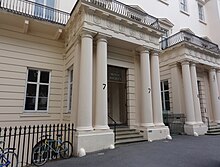
Back Royal Society Afrikaans Royal Society ALS الجمعية الملكية Arabic الجمعيه الملكيه ARZ Royal Society AST London Kral Cəmiyyəti Azerbaijani Лонданскае каралеўскае таварыства Byelorussian Лёнданскае каралеўскае таварыства BE-X-OLD Британско кралско научно дружество Bulgarian রয়েল সোসাইটি Bengali/Bangla
 | |
| Formation | 28 November 1660 |
|---|---|
| Headquarters | London, SW1 United Kingdom |
| Coordinates | 51°30′22″N 00°07′56″W / 51.50611°N 0.13222°W |
Membership |
|
Patron | Charles III |
President | Sir Adrian Smith |
Foreign Secretary | Mark Walport and Alison Noble (jointly) |
Treasurer | Jonathan Keating |
Main organ | Council |
| Staff | ~225 |
| Website | royalsociety |
| Remarks | Motto: Nullius in verba ("Take nobody's word for it") |

The Royal Society, formally The Royal Society of London for Improving Natural Knowledge, is a learned society and the United Kingdom's national academy of sciences.[1] The society fulfils a number of roles: promoting science and its benefits, recognising excellence in science, supporting outstanding science, providing scientific advice for policy, education and public engagement and fostering international and global co-operation. Founded on 28 November 1660, it was granted a royal charter by King Charles II and is the oldest continuously existing scientific academy in the world.[2]
The society is governed by its Council, which is chaired by the society's president, according to a set of statutes and standing orders. The members of Council and the president are elected from and by its Fellows, the basic members of the society, who are themselves elected by existing Fellows. As of 2020[update], there are about 1,700 fellows, allowed to use the postnominal title FRS (Fellow of the Royal Society), with up to 73 new fellows appointed each year from a pool of around 800 candidates.[3] There are also royal fellows, honorary fellows and foreign members. Up to 24 new foreign members are appointed each year (from the same pool of 800) and they are allowed to use the postnominal title ForMemRS (Foreign Member of the Royal Society). The Royal Society president is Adrian Smith, who took up the post and started his five-year term on 30 November 2020,[3] replacing the previous president, Venki Ramakrishnan.
Since 1967, the society has been based at 6–9 Carlton House Terrace, a Grade I listed building in central London which was previously used by the Embassy of Germany, London.
- ^ "The formal title as adopted in the royal charter" (PDF). Royal Society. Archived from the original (PDF) on 10 April 2016. Retrieved 14 November 2014.
- ^ Ellis Rubinstein, "Science Academies in the 21st Century: Can they address the world's challenges in novel ways?" Treballs de la SCB. Vol. 63, 2012, pp. 390. doi:10.2436/20.1501.02.130. Archived 5 February 2023 at the Wayback Machine.
- ^ a b Cite error: The named reference
fellowwas invoked but never defined (see the help page).